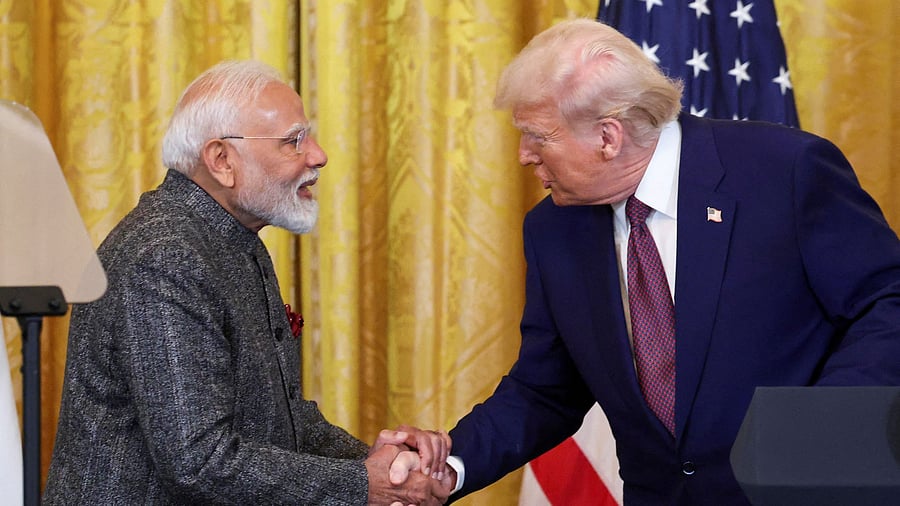
US President Donald Trump and Indian Prime Minister Narendra Modi shake hands.
Credit: Reuters File Photo
New Delhi: With his campaign promise to quickly bring peace in Ukraine and Gaza still unfulfilled, the India-Pakistan ceasefire announced on Saturday gave United States President Donald Trump a chance to live up to his “dealmaker-in-chief” fame, notwithstanding New Delhi’s refusal to acknowledge his and his administration’s role.
“Great work from the President’s team, especially Secretary Rubio,” Trump’s Vice President J D Vance wrote on X.
He was referring to the US Secretary of State and National Security Advisor, Marco Rubio, whom he joined in reaching out to the leaders and other top brass of the two governments in South Asia. “And my gratitude to the leaders of India and Pakistan for their hard work and willingness to engage in this ceasefire,” added Vance.
Hours before New Delhi and Islamabad announced the ceasefire, the US called out Pakistan for supporting terrorism, but, at the same time, also conveyed to India that diplomacy, not military offensives, could bring about a ‘solution’ to the problem.
In calls to External Affairs Minister S Jaishankar of India and Deputy Prime Minister and Foreign Minister Ishaq Dar of Pakistan, Rubio emphasised that both sides need to identify methods to de-escalate and re-establish “direct communication to avoid miscalculation”.
He also proposed US support in facilitating productive discussions between India and Pakistan to avert future disputes.
“Well, obviously, in today’s world, that’s a call that we have been making for decades,” Tammy Bruce, the spokesperson of the US State Department, said when a journalist asked her if Washington, DC, shared New Delhi’s view that Pakistan supported terrorism.
“And clearly what happened in Kashmir is awful, and we’ve all – of course, we send our condolences. The world has rejected the nature of that kind of violence overall, of course, and certainly the President has and continues to. But at this moment in time, there is like one thing that has to stop, which is a back-and-forth and a continuation of this, and that is what we’re focused on right now,” said Bruce, hours before the ceasefire between India and Pakistan was announced.
She said that the message from the US to India and Pakistan was that the violence should stop and that military actions had clearly, for generations, proven that it is not a solution because it never ends. “There has to be a change in that regard. So obviously, when it comes to solving a problem, this administration has made it clear that war, the military, and more violence are not a solution. Diplomacy is a solution, and new ideas exist to stop generational violence and problems,” said the spokesperson of the US State Department.
